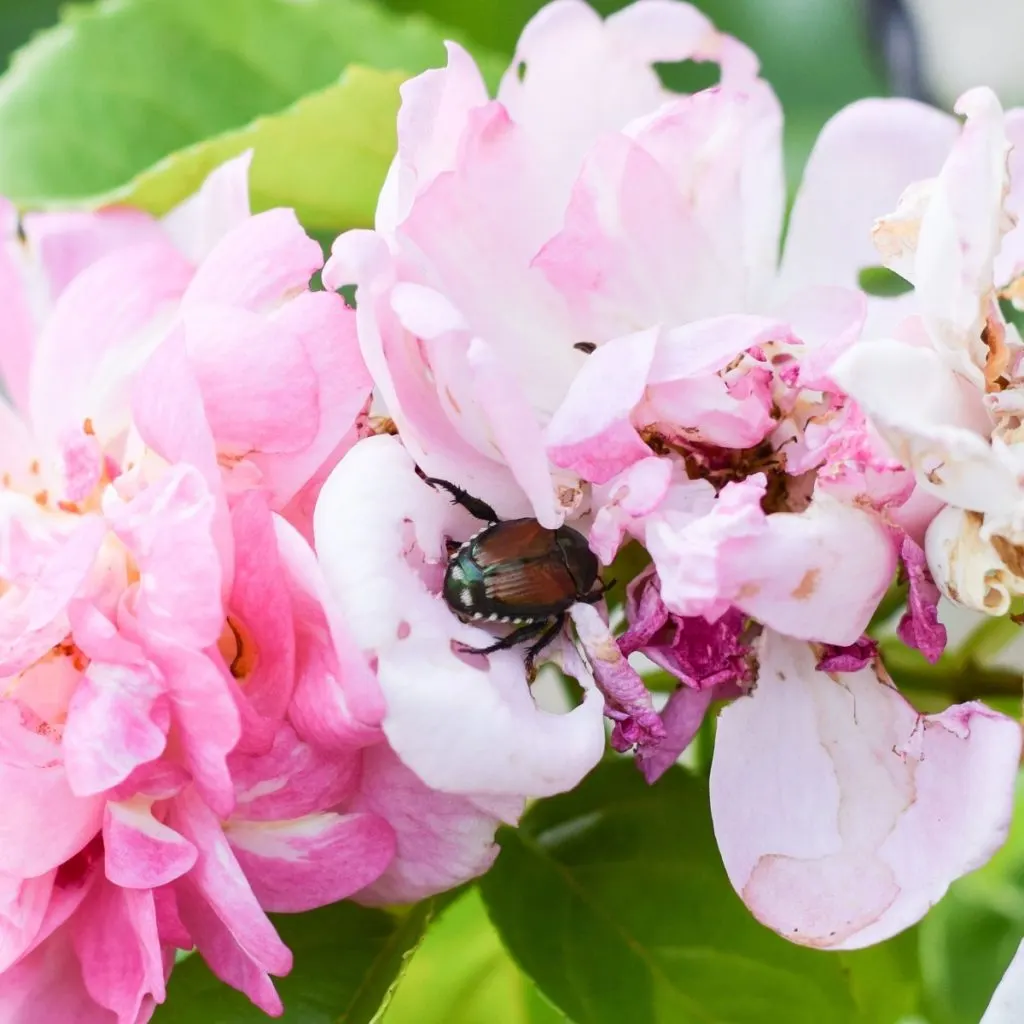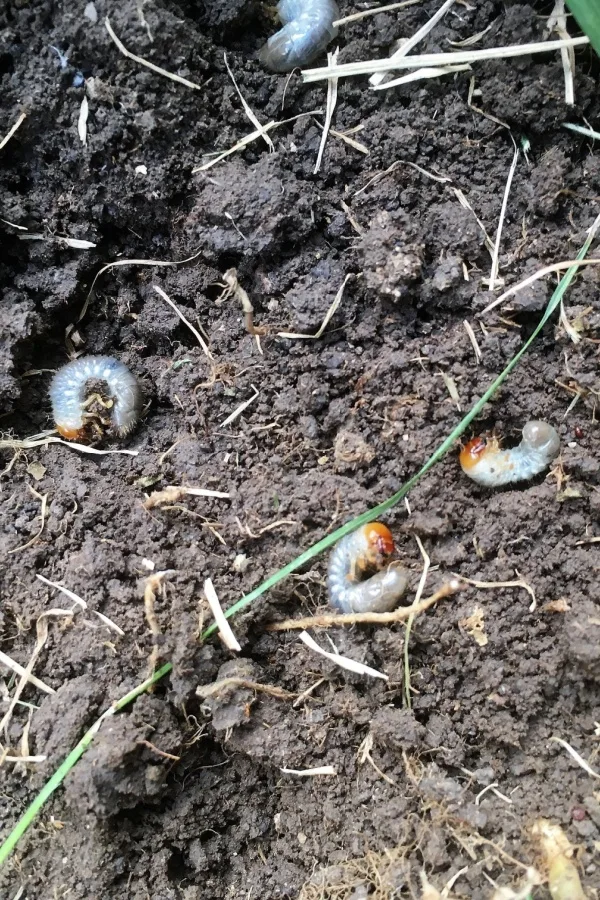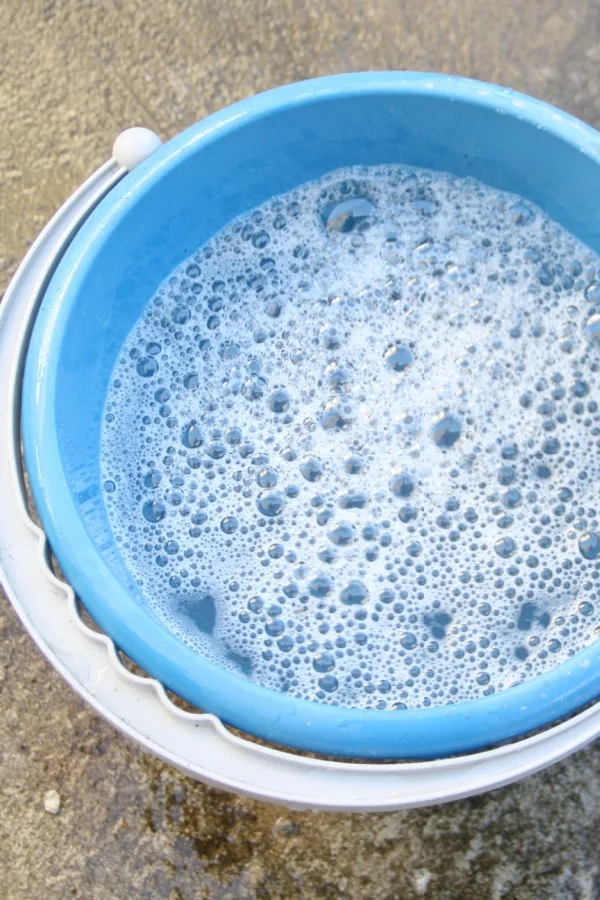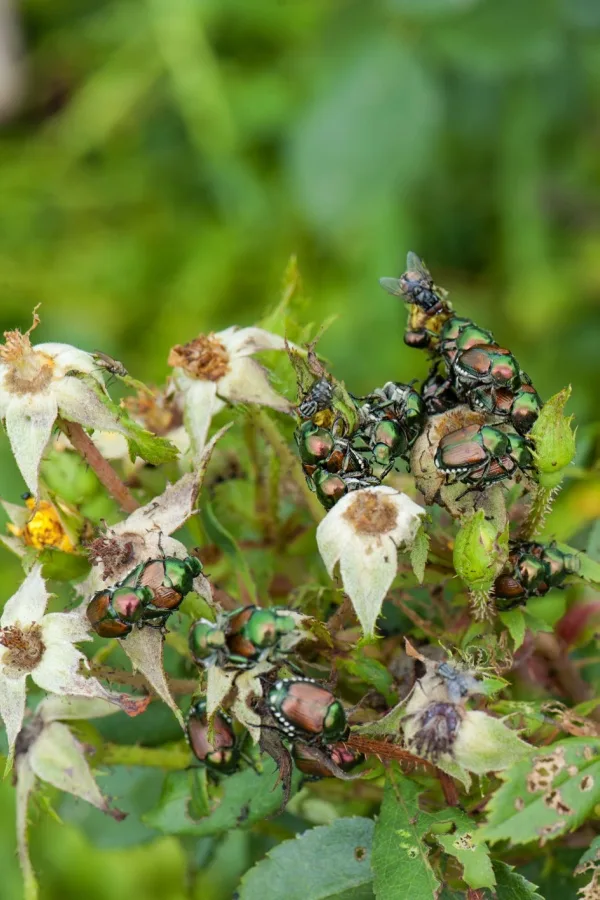Are you looking for a few simple and safe ways to protect your rose bushes from the devastating damage Japanese beetles can bring?
It happens like clockwork – around the end of June and early July, Japanese beetles start to seemingly appear out of nowhere. Before you know it, what starts out as just a few quickly turns into hundreds of shiny brown and green insects devouring fruit trees, vegetables, pine trees, and, you guessed it – your rose bushes!
If left alone, Japanese beetles will end up completely stripping plants of all their foliage. And in as little as just a few days! Unfortunately, once one plant is destroyed, they quickly move on to the next – with no end in sight.

Since Japanese beetles are not native to the United States, they are considered to be an invasive species. What’s more, there isn’t a natural predator for these flying insects, so their numbers keep increasing year after year.
While you can certainly find several different commercial sprays and insecticides available, most of these are questionable when it comes to using around your family, pets – and around beneficial insects. The good news? You can actually protect your rose bushes from Japanese beetles with a few simple, safe, and all natural solutions!
3 Ways To Protect Rose Bushes From Japanese Beetles
Japanese Beetle Lifecycle
Before we take a look at how to get rid of Japanese beetles, it’s important to understand their lifecycle. Not only are the adult insects a problem, but their juvenile form is as well.
Along with constantly eating, an adult female beetle’s main job is to lay their eggs. And can they ever do so in astonishing numbers. In fact, each female is capable of laying between 40 to 60 eggs.
These eggs are laid in the soil during the early summer months. They then hatch mid-summer in the form of grubs. These grubs spend their time underground feasting on the roots of various plants and grasses. This often attracts moles to your property – a whole other garden pest to contend with!

Around late fall, the grubs burrow down into the soil where they overwinter. By spring, the grubs resurface and emerge as adults. Adults that then come out to find plants like your rose bushes to feed on.
The more adults that are allowed to live, the more grubs and beetles there will be the following year. Which is exactly why it’s so important to take steps now to stop the infestation from growing and wiping out your rose bushes. And to do just that – here are three great solutions, starting with one of the best – cedar oil spray!
#1 Cedar Oil Spray
In order to protect your rose bushes from Japanese beetles right from the start, you can create a great, all-natural repellent spray using cedar oil and water.
This mixture does not kill the beetles. However, it works to help deter the insects from landing on your rose bushes in the first place. As an added bonus, if there are already any Japanese beetles flying on your bushes, they will quickly leave as soon as the spray hits the leaves!

Look for a pure Eastern cedar oil when creating this spray. Add 1.5 tablespoons to one gallon of water. Then, add in a few drops of liquid dish soap or olive oil and mix well. The oil or soap will help the solution stick to the foliage better. Product Link: 8oz Eastern Red Cedar Oil
Use a pump sprayer to apply the cedar oil spray thoroughly on your rose bushes. Be sure to get both the top and bottom of the leaves. Once dried, the scent will linger on the plant for a few days. This can be enough to help deter any Japanese beetles passing by looking for a tasty treat.
For best results, reapply every two to three days for the first couple of weeks when Japanese beetles are most active. You will also need to reapply the mixture after rain or heavy morning dew.
Hand Picking – Protect Rose Bushes From Japanese Beetles
If you still notice a few stray Japanese beetles on your rose bushes, one of the easiest ways to protect them is by hand picking. By simply going out and inspecting your bushes during the usual two to three-week period when Japanese beetles are in full force, you can keep them in check.
With hand picking, you can stop emerging adults as soon as you find them. And by being proactive, you stop the beetles from laying eggs for future generations. It’s a win-win that doesn’t cost you anything but a little time!

All you need is a bucket or big bowl of water and a few drops of liquid dish soap. As you walk along your rose bushes, knock off or pick the beetles and drop them into the soapy water.
Hand pick the Japanese beetles either early in the morning or mid-afternoon when the beetles are most active. If you have a large infestation, go out twice a day. If you stay on top of things, you can have an infestation under control in as little as one week.
Neem Oil Spray – Protect Rose Bushes From Japanese Beetles
Another great option is to use all natural neem oil. Neem oil is a great way to protect your rose bushes when Japanese beetles are arriving in big numbers. This organic solution is not only safe for pollinating insects when used correctly, but also works to eliminate the beetles at all stages of their lives.
Neem oil is made from the liquid that comes from pressing the seeds of neem trees. It has been used for generations as a natural pest control method – not only for Japanese beetles but for a whole host of other garden pests. See “How To Use Neem Oil On Plants”
The key is to apply it early in the morning or late at night when pollinators are less active. Once dried, the neem oil is safe for these beneficial insects since they don’t actually consume the plant’s tissue.

Simply mix 4 teaspoons of 100% cold-pressed neem oil with one gallon of water in a pump sprayer. Affiliate Product Link: HARRIS Neem Oil Cold Pressed Water Soluble Concentrate
Before spraying, add in a few drops of liquid dish soap or olive oil and mix well. This again will help to let the mixture stick to the foliage and be more effective. Spray an even coat all over the rose bush foliage and flowers. Reapply weekly or after it rains.
Avoid Using Commercial Insecticides And Traps
So why not just reach for a commercial insecticide to take care of beetles? Because in most cases, they come with a whole slew of problems of their own and often aren’t worth introducing into your property.
The main issue with using insecticides is that they kill not only unwanted pests but also harm beneficial insects as well. Not only does this mess up the balance of natural pest controls, but it also greatly reduces the number of pollinators around your property.
In addition, stay away from Japanese beetle traps and lures. This is because the beetles are attracted to the strong scent the traps give off, which often ends up bringing way more beetles to your property than would get there naturally.
While you definitely will trap and kill several beetles using these traps, your overall beetle population will likely end up multiplying over time. This is because not all beetles end up in the traps, which results in even more pests flying around, mating, and multiplying.
So while this year might seem like a “win” against the Japanese beetle fight now, next year will be a whole other story.
Here’s to safely and naturally protecting your rose bushes and other plants against an infestation of Japanese beetles. For tips on natural pest control for your plants, be sure to check out: 3 Simple Ways To Stop Aphids In Your Vegetable Garden!
Simple Garden Life
Follow Our Facebook Page For Even More Great Tips! Simple Garden Life Facebook Page
Simple Garden Life is a website dedicated to keeping gardening fun, simple and enjoyable! We publish two new articles each week along with a new garden podcast episode every two weeks. This article may contain affiliate links.
